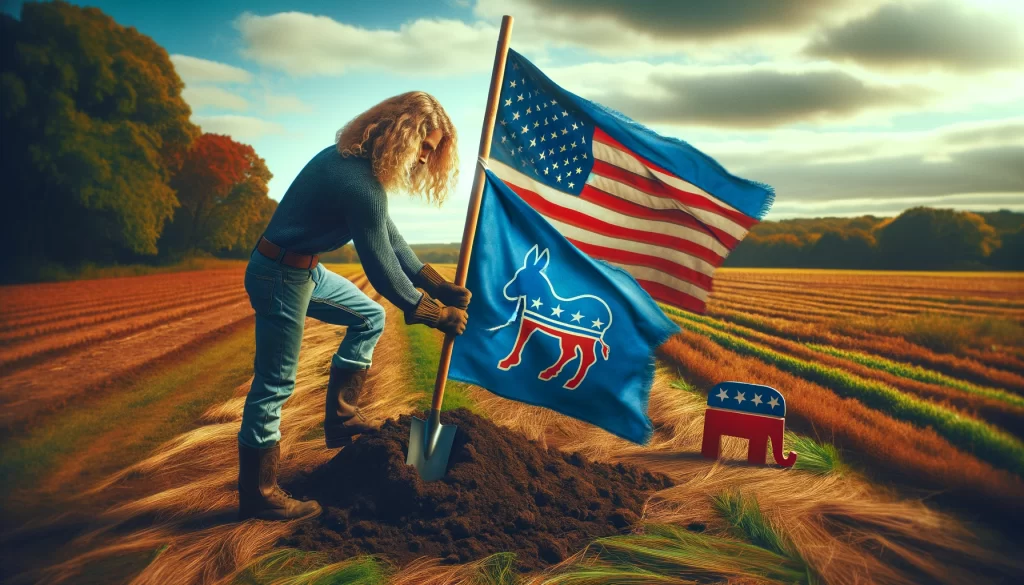In the heart of America, a young man named Dakota Adams is embarking on a journey unlike any other. Once living under the shadow of his father, Stewart Rhodes, a notorious figure known for founding the Oath Keepers, Dakota is now stepping into the light, aiming to redefine his path.
Dakota Adams isn’t your average college student. Alongside his studies and work in construction, he’s taken on the role of a volunteer firefighter and is now diving into the political arena with a Democratic campaign for Montana’s Legislature. His decision to sell his old rifles, body armor, and tactical gear, remnants of a past life attending anti-government protests with his father, marks a significant step in his journey to distance himself from a childhood he describes as isolating and abusive.
Running as a Democrat in the deeply Republican northwestern corner of Montana, Dakota is aware of the challenges that lie ahead. This region, a stronghold for militia sympathizers and doomsday preppers, overwhelmingly supported Donald Trump in the 2020 presidential election. Yet, Dakota sees his campaign not as a fruitless endeavor but as an opportunity to share his unique story and vision for democracy and personal responsibility.
Dakota’s childhood was anything but ordinary. Growing up with Stewart Rhodes, he was immersed in a world filled with paranoia and conspiracy theories. Rhodes, who Dakota refers to by his first name, was described as lazy and overly concerned with his own significance. The family lived in constant fear, moving frequently and remaining isolated within militant right-wing political circles. This way of life came to an end in 2018 when Dakota’s mother, Tasha Adams, filed for divorce.

The events of January 6, 2021, when the U.S. Capitol was stormed in an attempt to overturn the presidential election results, did not come as a surprise to Dakota. Seeing the dangers posed by such extremism, he felt compelled to reevaluate his beliefs and consider his own role in safeguarding democracy.
Now 27, Dakota is catching up on the education he missed during his unconventional upbringing. Despite the challenges, he is determined to understand himself better and move forward. His campaign for the Legislature has garnered support from local Democrats and has provided him with a platform to connect with voters on a personal level.
Dakota’s approach to campaigning is as unique as his background. Refusing to compromise his identity, he engages with voters as his true self, wearing a leather jacket, band T-shirts, and a skull ring. This authenticity, he believes, resonates more with people than conforming to a stereotypical image.
Understanding the concerns of his constituents, Dakota focuses on practical issues such as housing costs, property taxes, and the need for sustainable growth. He acknowledges the challenges of changing minds in a deeply conservative area but remains committed to trying, regardless of the outcome of the election.
This article is based on the following article:

Background Information
By exploring these topics more comprehensively, the reader will gain a richer understanding of Dakota Adams’ story and its implications for understanding the complexities of modern American life, the enduring strength of democratic principles, and the capacity for personal reinvention and social engagement.
1. The Role of Militias in American History and Society
Militias have a long-standing presence in American history, dating back to the colonial era. Originally formed as citizen armies to protect communities, their role has evolved over time. In contemporary America, the term “militia” often refers to private groups that organize independently of the official armed forces, usually around a shared ideology that typically involves a deep commitment to what they perceive as constitutional rights, particularly around gun ownership and government overreach. The Oath Keepers, for example, see themselves as defenders of the Constitution, prepared to resist what they view as tyranny by the federal government. This context is vital for understanding the environment Dakota grew up in, characterized by extreme views on government and personal liberty.
2. Montana’s Unique Political and Cultural Landscape
Montana is a state marked by its rugged individualism and libertarian values. The state’s political culture is complex, blending conservative principles with a strong value on personal freedoms and skepticism of government intervention. This mix has made Montana a hotspot for alternative and far-right groups, including militias. Dakota’s decision to run as a Democrat in this environment speaks to his desire to challenge prevailing norms and offer an alternative vision for his community.
3. The January 6, 2021, U.S. Capitol Riot: A Turning Point
The attack on the U.S. Capitol was a watershed moment in American politics, revealing the potential for violence fueled by political extremism. Stewart Rhodes’ participation and subsequent conviction place Dakota’s personal story within a national conversation about democracy, extremism, and the rule of law. This event underscores the stakes of Dakota’s political engagement, as it represents a direct challenge to the ideologies that led to the insurrection.
4. Democratic Processes and State Governance
Dakota’s campaign for the Montana Legislature invites a closer look at the functioning of American democracy at the state level. State legislatures are crucial in shaping policies that affect daily life, from education and health care to gun laws and environmental regulations. By choosing to engage in this arena, Dakota is participating in a foundational aspect of democracy: the idea that individuals can effect change through elected office. Understanding the significance of state legislatures helps contextualize Dakota’s campaign as an attempt to influence policy and represent diverse viewpoints.
5. The Impact of Upbringing on Personal Development and Political Ideology
Dakota’s story is also a study in the psychological effects of growing up in an environment characterized by fear, isolation, and extreme ideology. The impact of such an upbringing on personal development and socialization is profound, often requiring significant work to overcome. Dakota’s efforts to redefine his identity and beliefs outside of his father’s shadow highlight themes of resilience, personal growth, and the quest for a sense of belonging and purpose. His story illustrates the complex interplay between personal history and political beliefs, showcasing the potential for transformation.
6. The Broader Implications for American Society and Democracy
Finally, Dakota’s journey from a childhood immersed in a militia environment to a young adult actively seeking to contribute to his community through political engagement touches on broader themes relevant to American society. It raises questions about the nature of extremism, the challenges of bridging deeply divided political and cultural divides, and the possibilities for personal and societal change. His story serves as a reminder of the ongoing struggle to define the values that shape American democracy and the role that individuals play in that process.

Debate/Essay Questions
- Can someone from a deeply conservative or extremist background effectively represent a progressive viewpoint in a politically polarized environment?
- Is it possible to change deeply entrenched political and cultural views within communities known for strong ideological beliefs, such as Dakota’s attempt in Montana?
Please subscribe to Insight Fortnight, our biweekly newsletter!
